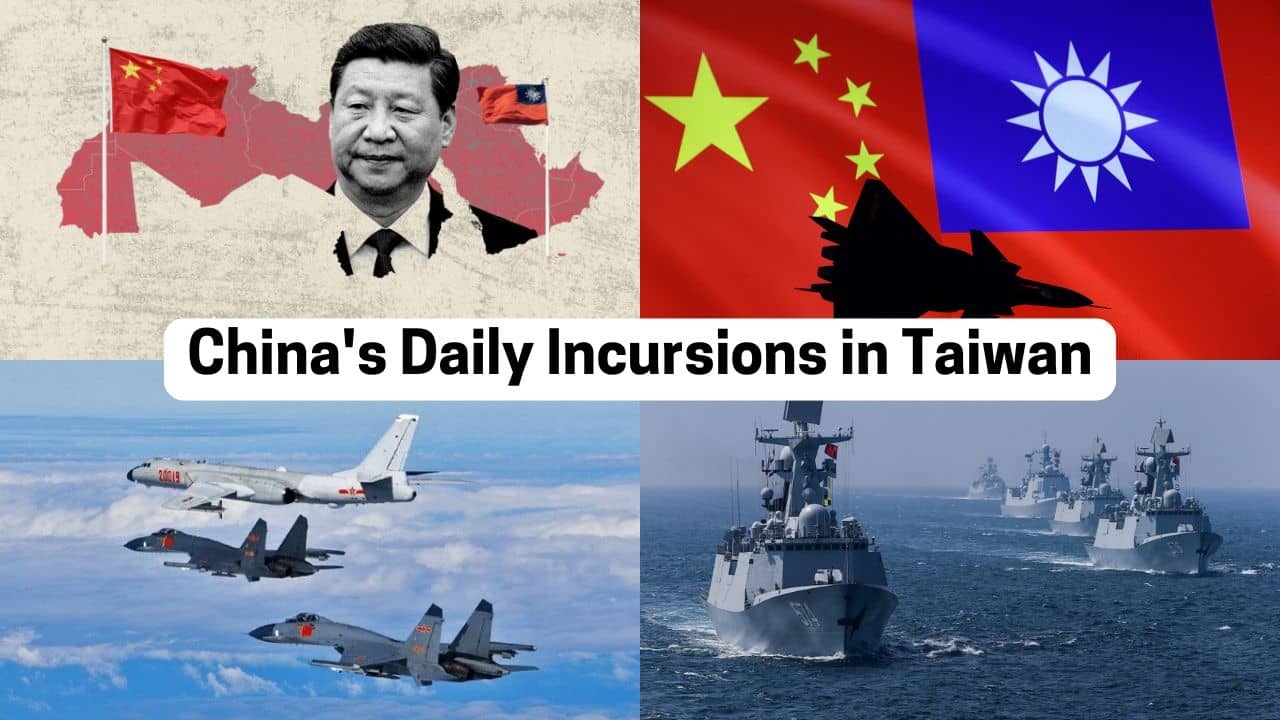China's Daily Air Violations in Taiwan: An Escalation of Aggression
Taiwan’s Ministry of National Defence reported the largest incursion in July 2024, when 56 Chinese warplanes crossed the median line into Taiwan’s ADIZ.
Total Views |

Beijing has stepped massively its daily air incursions since March 2024 into the Taiwanese Air Defense Identification Zone (ADIZ), constituting a very significant ratcheting in Communist China’s military behaviour. This is not an isolated incident but part of a wider campaign to pressure Taiwan and sow discord in the region.
Daily Air Violations
The People’s Liberation Army Air Force (PLAAF) in particular has flown numerous sorties into Taiwan ADIZ, reaching as many as 439 incursions just within the span of July 2024. This surpasses the previous records, with only August 2022 having had more military exercises. The sorties include fighters, bombers, and reconnaissance aircraft that have entered the middle of the Taiwan Strait, which has long been an unofficial line separating Chinese-claimed airspace from Taiwanese-controlled airspace.
These disruptions are part of a strategy to acclimatise Taiwan officials and ordinary citizens to Chinese military aircraft operating in the island’s airspace while also eroding morale among Taiwanese pilots. After every incursion, Taiwan needs to scramble jets and deploy defence systems, which are expensive implements that break down over time, plus fighter pilots might become tired.
Taiwan’s Ministry of National Defence reported the largest incursion in July 2024, when 56 Chinese warplanes crossed the median line into Taiwan’s ADIZ. This continued pressure is meant to pull Taiwan’s armed forces, with its limited resources, in every possible direction as a means of illustrative force targeting their autonomy.
Maritime Incursions and Illegal Arrests
Compounding their aerial offensive, Chinese naval ships have also made a series of incursions into Taiwanese waters, strengthening the attitude towards overseeing this vital territory. These naval incursions have involved the deployment of military and coast guard ships, usually disguised as routine patrols or exercises. The recent intrusion of People's Liberation Army Navy (PLAN) vessels into Taiwanese waters represents a flagrant breach of international law and an act characterising great power aggression.
In addition, many Taiwanese fishermen have reported being forcefully detained by Chinese authorities. The detentions are just the latest in a larger campaign designed to harass and manage the disputed waters. Chinese coast guard ships in June 2024 seized Taiwanese fishermen for accusations of illegal fishing operations inside the economic zone where Beijing claims it has exclusive rights. The actions have been deemed illegal and provocative by Taiwan, as well as international observers.
Impact on Taiwan
Constant air and naval exercises have taxed the resources of Taiwan's armed forces, which are perennially on high alert. The mobilisation of the military is now a regular occurrence within the airforce and sea, with Taiwan's Ministry of National Defense heavily strained in terms of defence obligations. These incursions are so frequent that they also sap Taiwan's resources, exhaust its military personnel, and diminish their threat awareness. At times Taiwan's air force has sat on alert for hours, waiting to respond in case of any heightening.
These moves by China are not just military takings but also a psychological attack, creating a feeling of impact and threat to the people in Taiwan. During the main political events, including Lai Ching-te taking office as president in May 2024, these forays into Taiwanese airspace have been in sync with major movements of Beijing sought after attempts to frighten Taiwan's democratic government.
Broader Implications
China's belligerence on the Taiwan issue is an integral part of its overall strategy to establish regional dominance and contest global rule-based order. The Chinese Communist Party (CCP) has always been sending military messages to Taiwan not to declare independence and show its dissatisfaction at the international community for supporting Taiwan.
To counter these provocations, Taiwan has worked to build stronger defence capabilities and partnerships with other democracies. In a gesture of solidarity and condemnation against China, the United States, Japan, and other friendly nations did not hesitate to vocalise their support for Taiwan. The US Department of Defense in July 2024 renewed its pledge to improve military interoperability with the island democracy and bolster its self-defences.
Conclusion
The continuous air and maritime encroachments on Taiwan by China make its move to subvert the sovereignty of Taiwan unmistakably evident, thereby endangering regional security. The latest escalation by Communist China, which followed aggression such as harassing and caging of Taiwanese fishermen illegally in the wanton fleets that are too close to Taiwan’s waters, is without respect for conventions or law. The international community must realise and deal with communist China's acts of belligerence if they want to make sure that there is no anarchy in the Indo-Pacific region.
Article by
Shomen Chandra
Sub Editor, The Narrative


